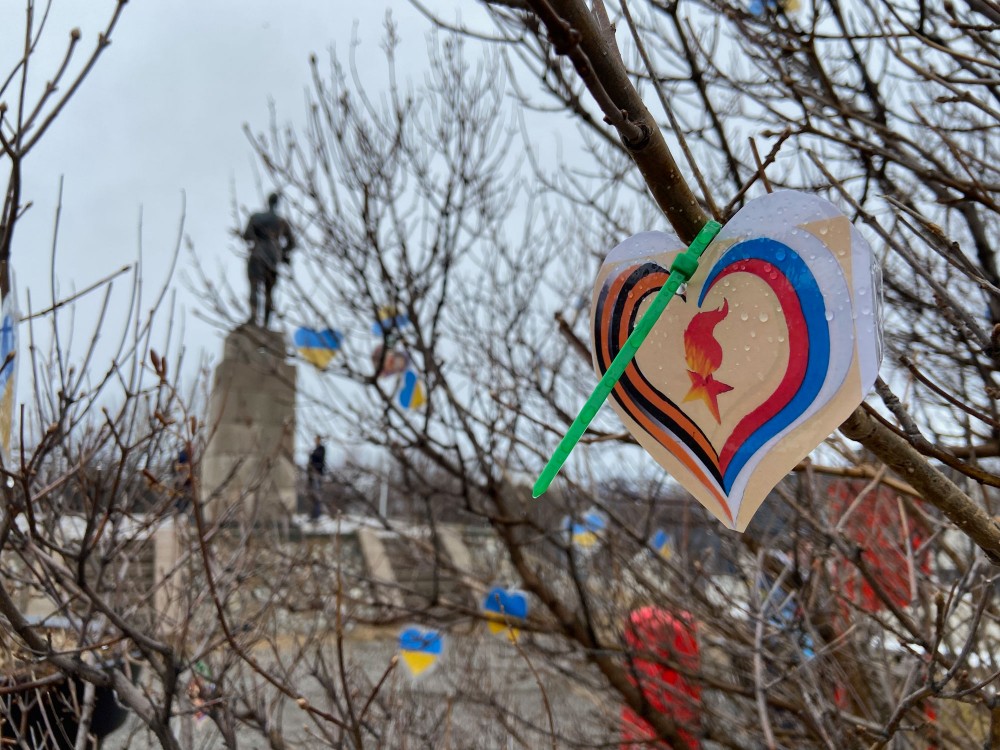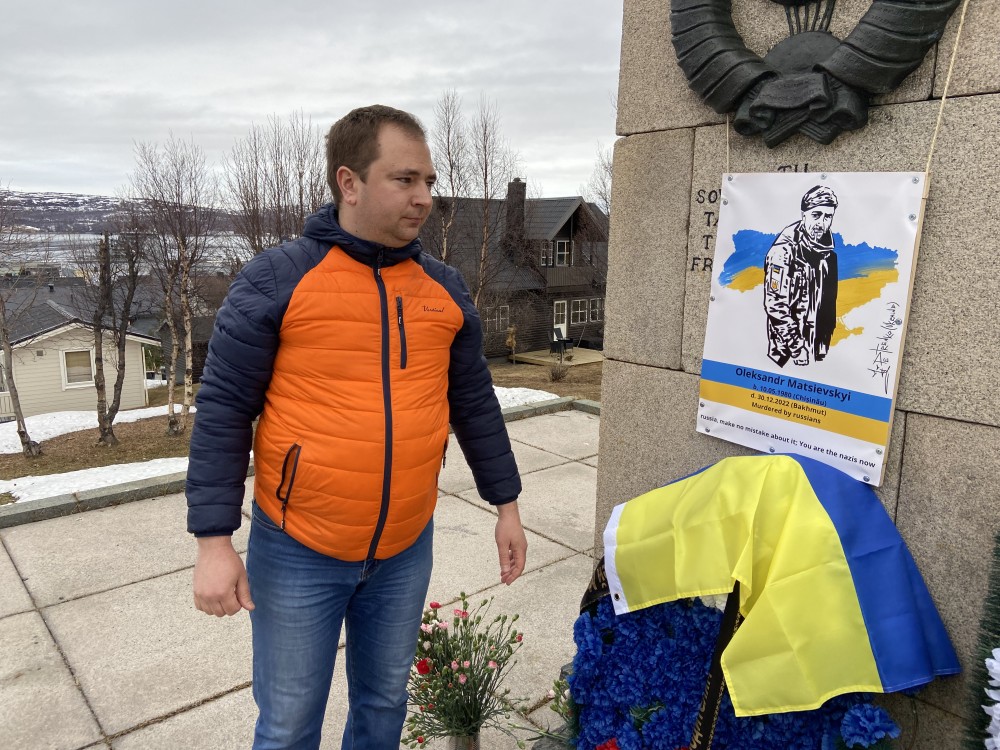Russian diplomats stir up emotions in Norwegian border town Kirkenes
Tensions in Kirkenes rise on Moscow's 'victory day,'

KIRKENES, NORWAY – There had been growing tensions in the air. Over the past days, someone had removed symbols of support for Ukraine in the local streets and replaced them with Russian stickers showing the Russian tricolour and the St.George’s ribbon.
At the same time, a social media page set up by local Russians were buzzing with patriotic contents, some of it hailing violence against Ukrainians.
The small Norwegian border town that over the past 30 years has built an identity on peaceful cross-border co-existence and cooperation appeared to be under attack by a small, but active group of Russian patriotic activists.
And it appeared tacitly supported by the local Russian general consulate and its leader General Consul Nikolai Konygin.
On the 9th of May, a group of Russians from the nearby Russian town of Zapolyarny traveled to Kirkenes to attend a ‘victory day’ ceremony by the local Kirkenes 2WW memorial. Ahead of the gathering, two of them tore down an anti-war poster attached to the memorial.
“Why are the Ukrainians trying to lay hands on this [monument] and do something that others don’t like,” the man from Zapolyarny explained to the Barents Observer. On his chest he carried a St.George’s ribbon, the symbol of Russian nationalism and war aggression.
“My grandfather was killed here in the fighting. He protected the Norwegians and liberated this land,” a woman told the Barents Observer. Also she came from Zapolyarny.
None of them explained why they had come to Norway to celebrate the day that is considered the main national holiday in Russia.
The Russian general consulate in Kirkenes regularly organises gatherings by the Kirkenes war memorial on the 9th of May, and announcements are normally made in advance on the consulate’s website and social media. This year, however, there was no public information available about the gathering.
Still, there were more than 40 people that attended the event.
General Consul Konygin did not comment to the Barents Observer how he had managed to assemble the many participants without using his normal information channels.
The poster that was removed paid tribute to Oleksandr Matsieveskiy, the Ukrainian prisoner of war that was killed by Russian soldiers after he said out load ‘glory to Ukraine.’
In a speech delivered at the event, Konygin underlined that “the 9th of May is a holy day for us, wherever we are, in Russia or abroad [and] nobody can prevent us from celebrating our great victory,” he said.
He also attacked “local politicians” in Kirkenes.
“I will not hide the fact that some local politicians have called for the cancellation of the celebration. But this is blasphemy,” he underlined.
Most likely, the diplomat had in mind Harald Sunde and Brede Sæther, the two local town council representatives that have been vocal opponents of the Kirkenes friendship agreements with Russian navy town Severomorsk.
However, Konygin stressed that “such disrespectful calls are not many in Norway.”
“For this, I am grateful. Russia and Norway share many thing in the North: the same challenges, the same geography, a common history,” he said. “Here are no dividing lines. Rather on the contrary, our peoples are unified. Norway and Russia are doomed to live together here in the North,” he said in his speech.
In a comment to the Barents Observer, History Professor at the UiT Arctic University of Norway Kari Aga Myklebost explains that contemporary Russian diplomacy is increasingly aggressive.
“What we see today in Kirkenes is a more subdued, but at the same time aggressive Russian line when it comes to memory diplomacy in relations with Norway, with the Russian Consulate General in Kirkenes inviting Russian participants to cross the border and insisting on keeping up the commemorative acts and Russian patriotic symbols,” she says.
“It is used to promote the Kremlin narrative of Victory and Red Army liberation despite growing local discontent in Kirkenes,” she adds.
Professor Myklebost is expert on Norwegian-Russian relations and currently involved in a major major research project on memory policy in the region. According to the professor, the Russian diplomats have not been as active ahead of the 9th of May this year compared with previous years.
“In general, May 9 commemorative acts have been conducted more covertly in Northern Norway this year compared to previous years. Ceremonies have not been announced beforehand by the Consulate General and only a few ceremonies have been posted in social media afterwards. This appears as a shift compared to the regular touring of war memorials and posting in social media by the Consulate General in April and May over the last years,” she says.
The Ukrainian poster that was removed from the war memorial in Kirkenes was not put away for long. Only a few hours after the General Consulate’s people from Zapolyarny had taken it down, representatives of the local Ukrainian diaspora in Kirkenes had put it back on the memorial.
“Today, Russia is a terrorist state, an aggressor state, and when we study history we see that aggressors sooner or later are severely punished,” Mykhailo Kozachenko told the Barents Observer.
“And all the Russian symbols we see here, the tricolour, the St.George ribbons, are all symbols of terrorism,” he underlined.
Located in Kirkenes, Norway, just a few kilometres from the borders to Russia and Finland, the Barents Observer is dedicated to cross-border journalism in Scandinavia, Russia and the wider Arctic. As a non-profit stock company that is fully own by its reporters, its editoral decisions are free of regional, national or private-sector influence. It has been a partner to ABJ and its predecessors since 2016.


